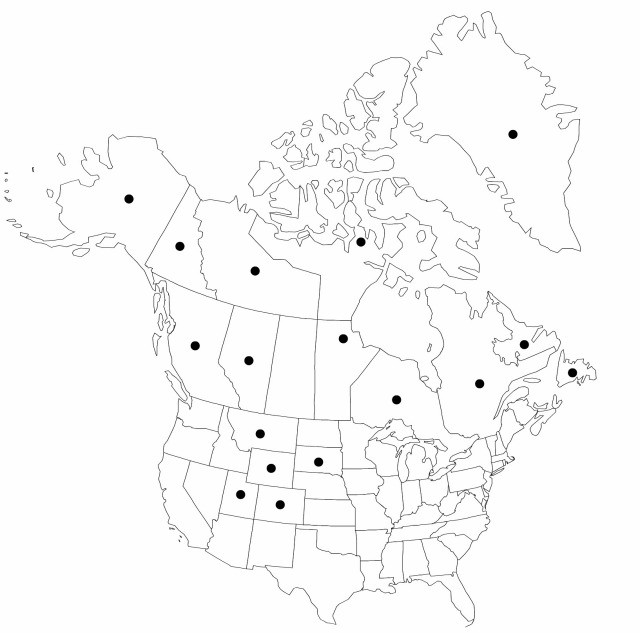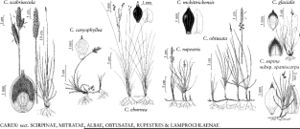Difference between revisions of "Carex rupestris"
Fl. Pedem. 2: 264. 1785.
FNA>Volume Importer |
imported>Volume Importer |
||
| (6 intermediate revisions by 2 users not shown) | |||
| Line 8: | Line 8: | ||
}} | }} | ||
|common_names=Carex des rochers | |common_names=Carex des rochers | ||
| + | |special_status={{Treatment/ID/Special_status | ||
| + | |code=F | ||
| + | |label=Illustrated | ||
| + | }} | ||
|basionyms= | |basionyms= | ||
|synonyms={{Treatment/ID/Synonym | |synonyms={{Treatment/ID/Synonym | ||
|name=Carex drummondiana | |name=Carex drummondiana | ||
|authority=Dewey | |authority=Dewey | ||
| + | |rank=species | ||
}} | }} | ||
|hierarchy=Cyperaceae;Carex;Carex sect. Rupestres;Carex rupestris | |hierarchy=Cyperaceae;Carex;Carex sect. Rupestres;Carex rupestris | ||
| Line 27: | Line 32: | ||
|elevation=0–2000 m | |elevation=0–2000 m | ||
|distribution=Greenland;Alta.;B.C.;Man.;Nfld. and Labr.;N.W.T.;Ont.;Que.;Yukon;Alaska;Colo.;Mont.;S.Dak.;Utah;Wyo.;Eurasia. | |distribution=Greenland;Alta.;B.C.;Man.;Nfld. and Labr.;N.W.T.;Ont.;Que.;Yukon;Alaska;Colo.;Mont.;S.Dak.;Utah;Wyo.;Eurasia. | ||
| − | |discussion=<p>Carex rupestris can be confused with C. obtusata if collected without the rhizomes. They may be distinguished by the presence of reddish dots on the sheath fronts of the culm leaves in C. obtusata and the absence of dots in C. rupestris.</p> | + | |discussion=<p><i>Carex rupestris</i> can be confused with <i>C. obtusata</i> if collected without the rhizomes. They may be distinguished by the presence of reddish dots on the sheath fronts of the culm leaves in <i>C. obtusata</i> and the absence of dots in <i>C. rupestris</i>.</p> |
|tables= | |tables= | ||
|references= | |references= | ||
| Line 36: | Line 41: | ||
-->{{#Taxon: | -->{{#Taxon: | ||
name=Carex rupestris | name=Carex rupestris | ||
| − | |||
|authority=Allioni | |authority=Allioni | ||
|rank=species | |rank=species | ||
| Line 50: | Line 54: | ||
|publication title=Fl. Pedem. | |publication title=Fl. Pedem. | ||
|publication year=1785 | |publication year=1785 | ||
| − | |special status= | + | |special status=Illustrated |
| − | |source xml=https:// | + | |source xml=https://bitbucket.org/aafc-mbb/fna-data-curation/src/2e0870ddd59836b60bcf96646a41e87ea5a5943a/coarse_grained_fna_xml/V23/V23_1058.xml |
|genus=Carex | |genus=Carex | ||
|section=Carex sect. Rupestres | |section=Carex sect. Rupestres | ||
Latest revision as of 20:38, 5 November 2020
Rhizomes brown or black, scaly. Culms 4–20 cm. Leaf blades channeled, tips soon becoming brown and dry, 2–12 cm × 1–3 mm. Spike with 3–15 pistillate flowers, 8–20 × 1.5–4 mm. Pistillate scales brown, margins hyaline, midvein paler, circular-ovate 2.5–4 × 1.4–2.6 mm, apex obtuse, often concealing perigynia. Staminate scales brown, margins hyaline, midvein paler, oblong-lanceolate to obovate, 2.5–3.5 × 1.4–2 mm, apex acute or obtuse. Perigynia 2.5–4 × 1–2 mm. Achenes oblong-obovoid, 2.2–2.5 × 1.5 mm. 2n = 52.
Phenology: Fruiting late spring–summer.
Habitat: Dry to mesic heaths, meadows, rock outcrops, talus slopes
Elevation: 0–2000 m
Distribution

Greenland, Alta., B.C., Man., Nfld. and Labr., N.W.T., Ont., Que., Yukon, Alaska, Colo., Mont., S.Dak., Utah, Wyo., Eurasia.
Discussion
Carex rupestris can be confused with C. obtusata if collected without the rhizomes. They may be distinguished by the presence of reddish dots on the sheath fronts of the culm leaves in C. obtusata and the absence of dots in C. rupestris.
Selected References
None.
